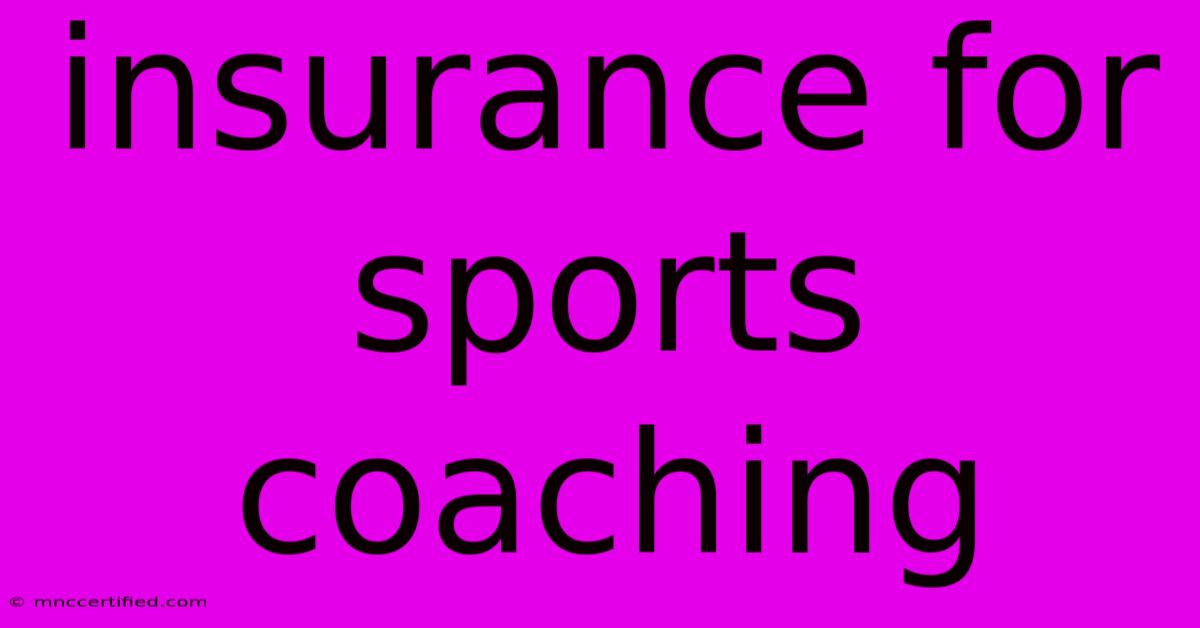Insurance For Sports Coaching

Table of Contents
Insurance for Sports Coaching: Protecting Yourself and Your Business
Coaching sports is a rewarding career, but it comes with inherent risks. From minor injuries to serious accidents, the potential for liability is significant. That's why securing the right insurance is crucial for any sports coach, whether you're a seasoned professional or just starting out. This comprehensive guide will explore the various types of insurance you should consider, helping you protect yourself, your business, and your clients.
Understanding Your Liability as a Sports Coach
Before diving into specific insurance policies, it's vital to understand the potential liabilities you face. As a coach, you could be held legally responsible for:
- Injuries sustained by participants: This is the most common risk. A player could be injured during a practice, game, or even while traveling to or from an event.
- Property damage: Accidents can occur leading to damage of equipment, facilities, or personal belongings.
- Negligence: Failure to provide proper supervision, instruction, or safety precautions can result in legal action.
- Allegations of abuse or misconduct: Protecting yourself and your participants from such accusations is paramount.
These risks highlight the necessity of adequate insurance coverage. Ignoring this crucial aspect can leave you vulnerable to significant financial losses and legal battles.
Types of Insurance for Sports Coaches
Several types of insurance can help mitigate the risks associated with sports coaching. The specific policies you need will depend on factors like the type of sport you coach, the age of your participants, and the location of your coaching activities.
1. General Liability Insurance
This is a fundamental policy for any sports coach. General liability insurance protects you against claims of bodily injury or property damage caused by your actions or those of your participants during coaching activities. This coverage extends to claims arising from negligence, such as inadequate supervision or faulty equipment.
2. Professional Liability Insurance (Errors & Omissions Insurance)
Also known as Errors & Omissions (E&O) insurance, this policy protects you against claims of professional negligence. This might include claims related to improper training techniques, inadequate instruction, or failure to provide proper medical attention. This is particularly relevant for coaches who provide specialized training or advice.
3. Accident Medical Insurance
While not directly covering your liability, accident medical insurance can help cover the medical expenses of participants who are injured during your coaching sessions. This can demonstrate your commitment to their well-being and potentially reduce the severity of future claims against you. Consider this alongside a robust first aid and emergency response plan.
4. Workers' Compensation Insurance (If applicable)
If you employ assistants or other staff, workers' compensation insurance is mandatory in most jurisdictions. This policy protects your employees in case of work-related injuries or illnesses, covering their medical expenses and lost wages.
5. Commercial Auto Insurance
If you use a vehicle for coaching activities, such as transporting participants to and from events, you'll need appropriate commercial auto insurance. This extends your liability coverage beyond personal use.
Finding the Right Insurance Provider
Choosing the right insurance provider is crucial. Factors to consider include:
- Coverage amounts: Ensure the policy limits are sufficient to cover potential claims.
- Premiums: Compare quotes from multiple providers to find the most cost-effective option without compromising coverage.
- Reputation: Research the provider's reputation and financial stability.
- Customer service: Choose a provider with responsive and helpful customer service.
Don't hesitate to ask questions. A reputable insurance provider will be happy to explain the details of their policies and help you find the best coverage for your needs.
Protecting Your Coaching Business: Beyond Insurance
Insurance is a vital component of risk management, but it's not the only one. Consider these additional steps:
- Develop comprehensive safety plans: Establish clear safety guidelines and procedures for your coaching sessions.
- Obtain necessary certifications and licenses: Demonstrate your competence and adherence to professional standards.
- Maintain detailed records: Keep accurate records of your coaching activities, including participant information, safety protocols, and incident reports.
- Seek legal counsel: Consult with a legal professional specializing in sports law to ensure your practices are compliant with relevant regulations.
By combining comprehensive insurance coverage with proactive risk management strategies, you can safeguard your coaching business and create a safer environment for your participants. Don't underestimate the importance of protecting yourself and your career; securing the appropriate insurance is the first crucial step.

Thank you for visiting our website wich cover about Insurance For Sports Coaching. We hope the information provided has been useful to you. Feel free to contact us if you have any questions or need further assistance. See you next time and dont miss to bookmark.
Featured Posts
-
Open On Thanksgiving 2024 Stores And Food
Nov 29, 2024
-
Jenkyns Defects To Reform Uk Says Farage
Nov 29, 2024
-
Hunter X Hunter Trading Cards
Nov 29, 2024
-
Kruger Investigated Over Assisted Dying
Nov 29, 2024
-
Raiders Chiefs Hopkins Week 13 Role
Nov 29, 2024